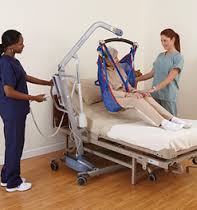Nursing home administrators and management work diligently to protect the health and safety of residents. Despite everyone’s best efforts and rendering the best care, accidents can happen, and can be the result of mechanical failure. One of the tasks performed by healthcare staff during routine care should be the inspection and maintenance of mechanisms used in the care of nursing home residents. For example, a mechanical lift, should be inspected to insure proper working condition so as to prevent a lift device failure leading to a fall and injury. In the event the nursing home fails to maintain equipment or knowingly fails correct a mechanical failure, the result of an injury to a resident can be a lawsuit resulting in findings of negligence.
Nursing Home Care Act: Was the condition or occurrence the proximate cause of injury or death?
If there is a condition or occurrence which is the proximate cause of injury, the individuals or organization can be found liable for negligence within the scope of the Illinois Nursing Home Care Act.[i] Within the Act there is a section describing a “safe resident handling policy[ii],” and requiring a policy to prevent injury due to mechanical failures. The policy requirement is listed in the Act as follows: “A facility must adopt and ensure implementation of a policy to identify, assess, and develop strategies to control risk of injury to residents and nurses and other health care workers associated with the lifting, transferring, repositioning, or movement of a resident.[iii]”
The safe resident handling policy should be followed and documented on a regular and consistent basis. Good recordkeeping and policy adherence is important, especially in the event of an injury or death and investigation in to the customs and practices used and whether a stated policy was followed or there was negligence leading to the injury or death.
Mechanical failures can include wheel chair lift failures and much more. Education and policies are essential.
While the Nursing Home Care Act specifically addresses wheel chair lifts and the importance of maintenance and insuring the mechanical fitness of equipment, there are many additional safety concerns and possibilities of mechanical failure. The proper operation of medical equipment used in the delivery of medicine, respiration machines, video resident monitoring are all important and can lead to injury and death. Make sure all mechanical equipment being used to lift, move and provide care for residents is working properly. It is important to maintain documentation of equipment checks for wear and damage.
Educating nursing home staff is important. Making sure the entire organization is trained on maintaining proper safety policies can help reduce the risk of resident injury and death.
Failure to maintain resident safety policies and failure to prevent the risk of injury through mechanical maintenance can lead to state discipline and fines.
The Illinois Department of Public Health and the Illinois Department of Financial and Professional Regulation can become involved in situations involving the injury or death of a nursing home resident. If nursing home administrators, managers or staff are found to have violated the law, there can be fines, professional discipline and more adverse consequences. In some cases, nursing homes can be closed.
The time to talk to a health care and liability and licensing attorney is before an accident happens. An experienced health care attorney can help nursing homes create policies and protocols that satisfy legal requirements so that the nursing home administration can establish its best efforts at satisfying its duties of care to residents. In the event there is an accident, also call a health care attorney to discuss important next steps.
About us: Michael V. Favia & Associates, P.C. is a health law and litigation firm in Chicago representing individuals, healthcare professionals and organizations with civil legal matters as well as professional licensing and regulation.
Chicago health law and litigation attorney Michael V. Favia and his associates in several locations and disciplines, advise and represent private individuals as well as healthcare professionals in all types of litigation and administrative matters involving licensing and regulatory agencies.
Michael V. Favia and Associates, P.C. represents individual physicians and health care organizations in the Chicago area with a variety of legal matters. With offices conveniently located in the Chicago Loop, Northwest side and suburban meeting locations, you can schedule a discrete meeting with an attorney at your convenience and discretion. Michael V. Favia & Associates is available at (773) 631-4580. Please visit www.favialawfirm.com and feel free to “Like” the firm on Facebook and “Follow” the firm on Twitter. You can also review endorsements and recommendations for Michael V. Favia on his Avvo.com profile and on LinkedIn.
[i] 210 ILCS 45/1-101 et seq.
[ii] 210 ILCS 45/3-206.05
[iii] 210 ILCS 45/3-206.05(b)

